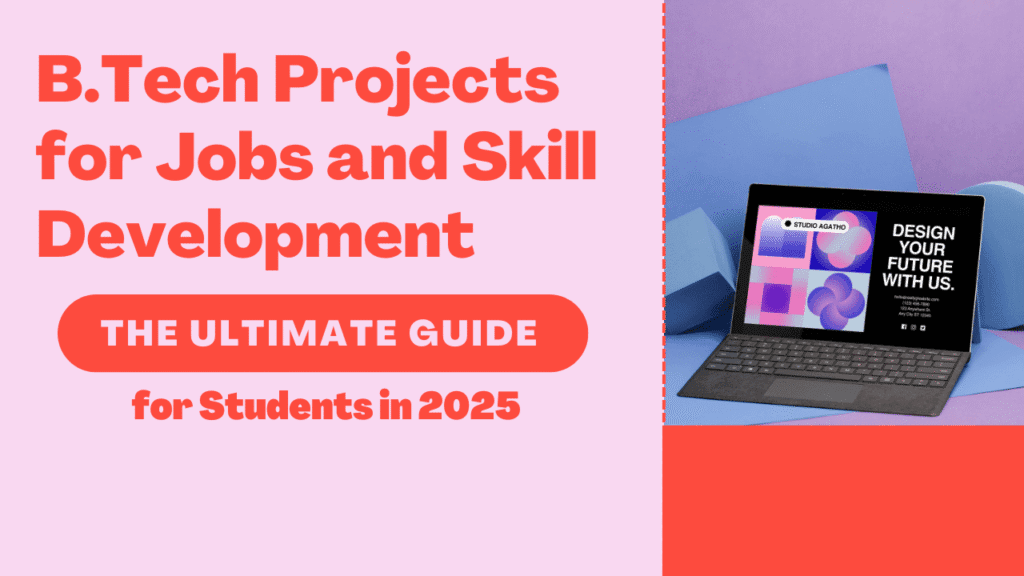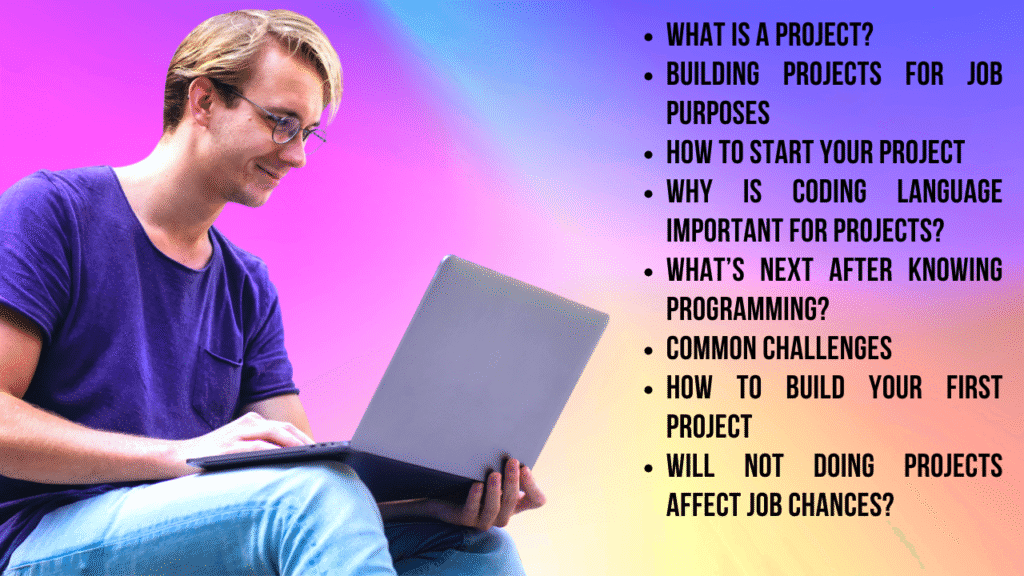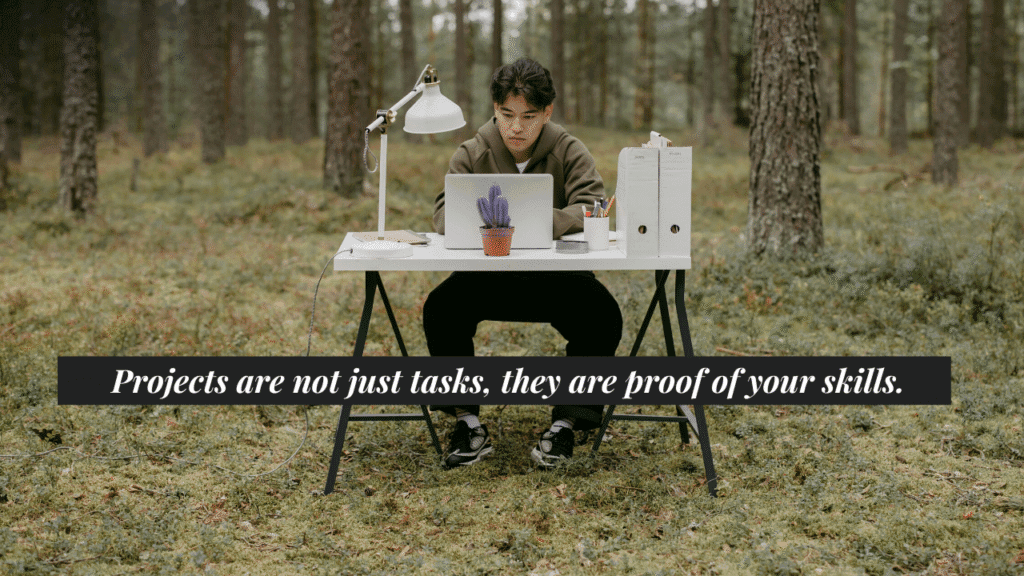B.Tech students usually have a number of doubts about B.Tech projects, what exactly a project is, what they should do, and how they should do it. So, in this project phase, they are completely clueless. Even within projects, there are two categories: one is projects we build on our own for skill development and to add to our resume, and the second is the B.Tech final year project.

What Is a Project?
Basically, a project means creating a solution to a real-time problem using our skills.
Example
In public places, fire accidents happen often. Sometimes, because no one notices them in time, the damage becomes huge. But if we can detect early, raise an alert, and handle the situation, the loss will be less. Taking this problem, if we design a fire detector with an alarm that raises an alert, that is a project.
These are very simple examples, but basically, picking a problem and solving it with your skills to build a product, whether a website or a hardware prototype, comes under projects.
Building Projects for Job Purposes
Building projects for job purposes, these are not mandatory in college, but we develop them ourselves.
The sole reason behind doing these projects is:
- One, we learn, and
- Two, they help with job purposes.
Does It Really Help?
The answer is 100% yes.
By developing a project on your own, you gain real-time experience, which is very valuable. And you can add this project to your resume. Especially for those trying off-campus jobs, this helps a lot.
| Resume Filtering | 80% of candidates get rejected in the first stage itself. |
| Competition | Thousands or even lakhs apply, but requirements are only in the hundreds. |
| Key to Stand Out | Unique features like an internship or a good project. |
Internship experience is more valuable than a project, but internships count only if you actually worked in a company or startup. Some courses advertise as “course + certificate + internship,” but such things don’t hold much value. Even if it’s without a stipend, if you get an internship at a startup or company, don’t miss it. And think twice before paying money for anything.
How to Start Your Project
Basically, until you start, no one has a clear idea. Because no matter how much you’ve learned, when you start implementing something in real time, you’ll encounter new concepts and technologies. For any functionality to work, new things will always come up. If you think, “I’ll learn everything perfectly and then start,” it won’t work.
Once you start, you’ll gradually get ideas, learn in parallel, and complete it. If you are strong in at least one coding language, you can start.
Why Is Coding Language Important for Projects?
The main reason is, whichever technology you use, you’ll always repeat the same concepts:
- loops
- if-else
- functions
Only the syntax differs.
If you clearly understand how loops and functions work, and when to use them, you’ve already come halfway. Syntax can be learned easily. No matter the programming language, if you are strong in one, you can learn others easily.
In case you don’t know any programming language yet, first learn one, then start building projects. If you’re wondering which to learn, prefer Python. Python has a lot of scope in game development, machine learning, and is also suitable and easy to learn for placements. So, no doubt, Python is a good choice.
What’s Next After Knowing Programming?
For ECE Students
Buy an Arduino and start with any of the many projects available. It’s the easiest and best way to start.
For CSE or IT Students
Better to build web development-related projects. Even for a simple web development project, different technologies are involved, and you have many options:
- HTML, CSS, JavaScript
- HTML, CSS, jQuery
- React
- Django with Python
- Bootstrap
So, you can use different stacks of technologies. There will be interconnections; learning one makes it easier to learn others.
Arduino Programming
We use C or C++. But still, programming there differs from what we learned before. The functionality and terminologies differ because we work with sensors and different functions.
Common Challenges
Project building is obviously a bit challenging. Many times, you’ll get stuck, don’t know how to proceed, don’t know why an error is coming, and don’t know how to resolve it. This is quite normal. Don’t think, “Why only me? Maybe I’m not capable.” Everyone faces this.
If you have a mentor, it becomes easier; it could be a faculty member or a friend who has worked on something similar. If you don’t have support from college or friends, the best way is to join communities. There are many student clubs and communities, web development clubs, full-stack communities, etc. You can find them on Google. Join them, there you’ll meet many students like you and seniors who have already built projects. Networking with them gives you huge advantages. Be active in the community, keep discussing with members, and definitely someone will help you. You can even collaborate to build projects together. That makes it much easier to figure out problems.

How to Build Your First B.Tech Project
Since this is your first one, choose the easiest approach. It may not be the best, but as a beginner, it’s the right first step. On YouTube, search “simple projects for B.Tech students.” You’ll get many results. If you’ve already fixed a domain, say web development, machine learning, or for ECE, embedded systems, image or speech processing, search specifically like “simple web development projects.” Then select a video and follow along step by step. Understand what they are doing.
If you just copy-paste their code and complete the project, it’s useless. Instead, understand the process.
Once you learn that, you can build your own project from scratch with your own idea. That experience will definitely help. Once you build such a project, you’ll get an idea of how things work. Then build another project, this time completely your own. Because most YouTube projects are very basic, like a tic-tac-toe game, a login page, etc., Many people do these, so your profile looks common among hundreds of others. That’s why try something new and unique. Think creatively. If you do, it will be great.
If you don’t have any ideas, the best option is to build a portfolio. On LinkedIn, many people upload creative portfolios, anime themes, Google clones, Netflix clones, etc. One guy built a Google clone portfolio and uploaded it; his post got a huge reach.
Many commented:
- “Please send your resume,” or
- “Are you interested in working as an intern?”
He even got an internship directly through LinkedIn and is now working as a software developer intern. So, if you can do something different, opportunities will come looking for you. LinkedIn is a powerful platform; you just need to learn how to use it properly.

Will Not Doing Projects Affect Job Chances?
If you have campus placements, and good companies visit your college and hire, then no big problem. But for off-campus aspirants, it’s a problem. Without projects, you won’t get jobs. Having a project doesn’t guarantee a job, but with the current competition, cracking an off-campus job is difficult. A good project increases your chances of selection.
So, for off-campus, the only way is to:
- Keep building skills
- Building projects
- Preparing a strong resume applying to every possible opportunity, and
- Give 100% until you land a job
Conclusion
Projects are your learning and job gateway.
Start small, learn gradually, and build something creative.
Be active in communities and on LinkedIn.
Don’t copy blindly; always understand and innovate.
With dedication and unique efforts, success will follow.